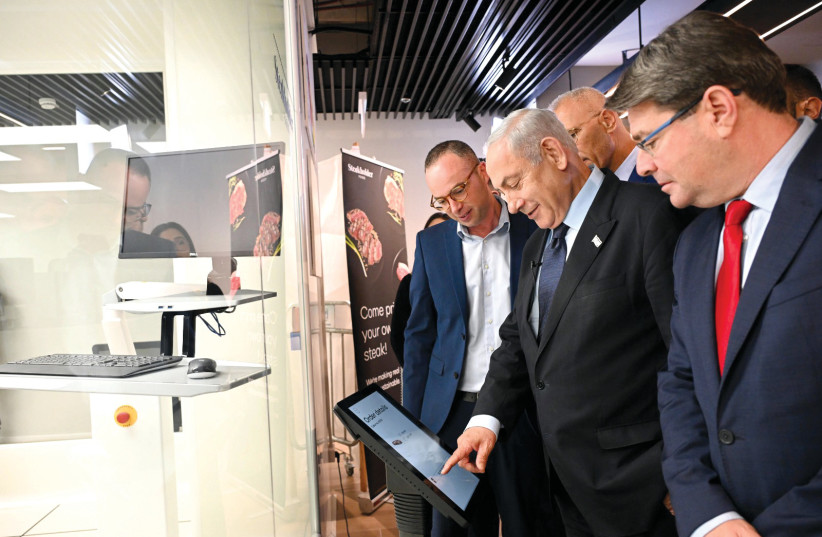The recognition that climate change can disrupt global food security, igniting a chain reaction that could lead to widespread famine, has stirred some societies into a frenzy of concern and action.
The imperative to unearth sustainable and resilient alternatives to conventional food production has never been more urgent.
Moreover, with a valuation surpassing $8 trillion and contributing to over 10% of the global GDP, as the World Bank projected, worldwide food and agriculture emerge as a colossal economic force.
There are enormous opportunities for Israeli innovation in these industries. The man leading the charge is Minister of Innovation, Science and Technology Ofir Akunis.
Earlier this year, Prime Minister Benjamin Netanyahu tasked Akunis and his office to formulate a national food technology plan in collaboration with the Prime Minister’s Office; the National Economic Council; and the Health, Agriculture, Economy and the Negev, Galilee and National Resilience ministries.

“Food tech is an industry with great potential that will make a huge contribution to Israel’s economy in the coming years, similar to cyber in the previous decade,” Akunis tells The Jerusalem Report.
“Food tech is an industry with great potential that will make a huge contribution to Israel’s economy in the coming years, similar to cyber in the previous decade.”
Ofir Akunis
He says that his ministry’s director-general is in the final stages of developing the plan, which Akunis will then submit to the government. The project will center on all aspects of food tech, from nutrition, packaging and food safety to cultured meat, novel ingredients, and alternative proteins.
“We want the country to see that food tech is at the top of our agenda,” Akunis says. “We want more companies, more competition, and we want to position Israel at the center of this industry.”
He adds, “The food tech industry has much untapped potential right now. We are just in the beginning stages.”
In June, BIRD – Israel-US Binational Industrial R&D Foundation – announced an $8 million investment in nine new projects between US and Israeli companies. Four of them were in the food tech or related industries. In the coming weeks, Akunis says, the foundation is expected to put out a new call for proposals explicitly centered on research in the industry. His ministry plans to earmark money for international food tech research collaborations as well.
In 2022, the nation secured the second spot globally, following the US, regarding investments directed toward alternative proteins. According to a report by Israel’s Good Food Institute, domestic start-ups operating within this sector gathered a substantial capital of around $454 million.
Israel is second after the US in fermented proteins, a sector that uses microorganisms like bacteria and fungi. The report indicates that Israel secured 18% of the global investments in this domain, amassing $147 million in 2022. Likewise, within the cultivated meat subsector, Israeli enterprises attracted slightly above $105 million in investments, constituting approximately 12% of the overall global investments in 2022, trailing behind the US.
“Israel’s food tech program has garnered international attention,” remarks Akunis. He highlights that countries such as Germany, Italy, and Morocco have proactively expressed their eagerness to explore potential collaborations with Israel.
However, he admits there are challenges ahead. While Israeli companies are strong in research and development, the problem is going from development to market – especially in areas like pharmaceuticals and, likely now, food tech.
Israel is known for its bureaucracy, and Akunis says he and the prime minister have met several times to discuss ways to ensure that companies can receive regulatory approval reasonably soon. This effort would involve the Agriculture, Environment, and Health ministries.
The Health Ministry has grappled with an enduring shortage of regulatory personnel, a predicament compounded by the likelihood that ministry staff might need more proficiency in the emerging realm of food tech. This convergence of factors could lead Israeli companies to lose enthusiasm.
Akunis says he will meet with Health Minister Moshe Arbel after the summer break to discuss the challenge.
And what about getting Israelis ready to eat these products?
Regarding willingness to replace red meat with lab-grown meat, Israel is ahead of the other countries, according to an Organization for Economic Cooperation and Development (OECD) report published in June.
When asked if they would try lab-grown meat, 41% of Israelis (the most) say they would be ready to eat meat substitutes, compared to 20% in France (the least).
“I am a very liberal and democratic person, and I am not going to force people into food tech,” Akunis says. But he believes that the alternatives are as good as the real thing, and probably some of them are even healthier.
“We are at the beginning of a revolution,” Akunis says. “It is the beginning for Israel and the whole world. “When people see that the products are good and good for you, the industry will start to grow.” ■
